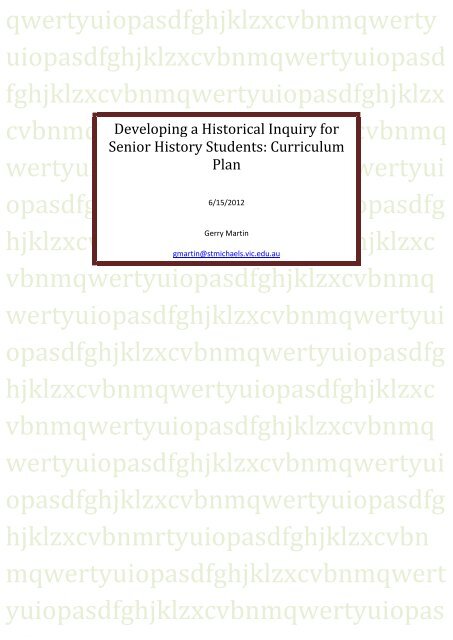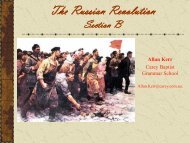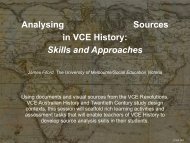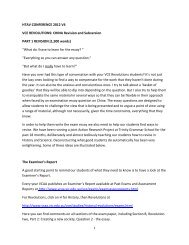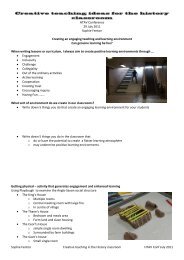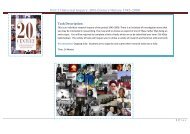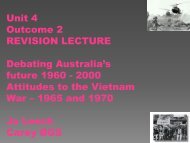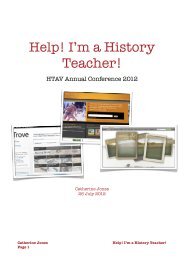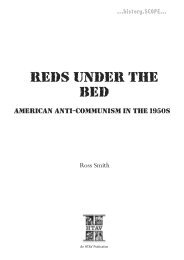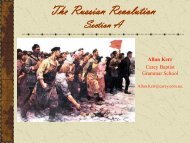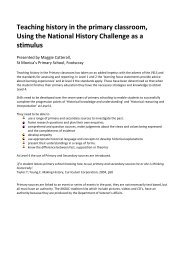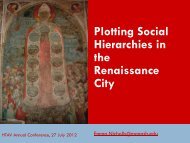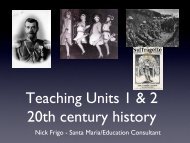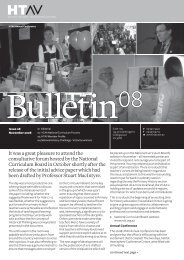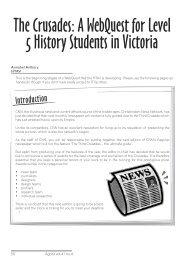Developing a Historical Inquiry for Senior History Students ... - HTAV
Developing a Historical Inquiry for Senior History Students ... - HTAV
Developing a Historical Inquiry for Senior History Students ... - HTAV
Create successful ePaper yourself
Turn your PDF publications into a flip-book with our unique Google optimized e-Paper software.
qwertyuiopasdfghjklzxcvbnmqwerty<br />
uiopasdfghjklzxcvbnmqwertyuiopasd<br />
fghjklzxcvbnmqwertyuiopasdfghjklzx<br />
cvbnmqwertyuiopasdfghjklzxcvbnmq<br />
<strong>Developing</strong> a <strong>Historical</strong> <strong>Inquiry</strong> <strong>for</strong><br />
<strong>Senior</strong> <strong>History</strong> <strong>Students</strong>: Curriculum<br />
wertyuiopasdfghjklzxcvbnmqwertyui<br />
Plan<br />
opasdfghjklzxcvbnmqwertyuiopasdfg<br />
6/15/2012<br />
hjklzxcvbnmqwertyuiopasdfghjklzxc<br />
Gerry Martin<br />
gmartin@stmichaels.vic.edu.au<br />
vbnmqwertyuiopasdfghjklzxcvbnmq<br />
wertyuiopasdfghjklzxcvbnmqwertyui<br />
opasdfghjklzxcvbnmqwertyuiopasdfg<br />
hjklzxcvbnmqwertyuiopasdfghjklzxc<br />
vbnmqwertyuiopasdfghjklzxcvbnmq<br />
wertyuiopasdfghjklzxcvbnmqwertyui<br />
opasdfghjklzxcvbnmqwertyuiopasdfg<br />
hjklzxcvbnmrtyuiopasdfghjklzxcvbn<br />
mqwertyuiopasdfghjklzxcvbnmqwert<br />
yuiopasdfghjklzxcvbnmqwertyuiopas
Subject <strong>Historical</strong> <strong>Inquiry</strong> Year 11<br />
Curriculum Areas VCE Unit 2 Twentieth Century <strong>History</strong> 1045-2000 Time Frame 7 Weeks<br />
Rational<br />
The historical inquiry is designed around the VCE Unit 2 Twentieth Century 1945-2000. Unit 2 focuses on three areas of study; Ideas and political power;<br />
Movements of the people; and Issues of the millennium. This inquiry unit must “consider some of the major themes and principal events of post-World War II<br />
history, and the ways in which individuals and communities responded to the political, economic, social and technological developments in domestic, regional and<br />
international settings”(VCAA 2004: 41).<br />
Desired Results (Stage 1)<br />
Established Goals: <strong>Students</strong> will be able to:<br />
Demonstrate understanding and develop skills involved in the historical inquiry process<br />
The VCE Unit 2 outcomes state that students should be able to:<br />
analyse and discuss how post-war societies use ideologies to legitimise their world views and portray competing systems<br />
evaluate the impact of challenge(s) to established social, political or economic power during the second half of the twentieth century<br />
analyse issues faced by communities arising from political, economic and/or technological change<br />
(VCAA 2004: 42-44)<br />
Understandings<br />
What understandings are desired? <strong>Students</strong> will understand…<br />
The process of a historical inquiry and its core skills of:<br />
Asking historical questions;<br />
<strong>Developing</strong> historical inquiry through research ;<br />
Describe historical context<br />
Examining <strong>Historical</strong> Sources <strong>for</strong> use as evidence ;<br />
Applying <strong>Historical</strong> Concepts (establish and evaluate historical significance,<br />
identify and describe and explain continuity and a change, explain and<br />
analalyse cause and consequence<br />
<br />
<br />
<br />
Recognise historical perspectives<br />
Evaluate historical interpretations<br />
Create and communicate historical arguments<br />
Essential Questions<br />
What essential questions will be considered?<br />
1. How do post-war societies use ideologies to legitimize their world view?<br />
2. How can movements of people challenge established social, political or<br />
economic power?<br />
3. To what extent do issues faced by communities cause change?
What key knowledge and skills will students acquire as a result of this unit?<br />
Knowledge<br />
<strong>Students</strong> will know…<br />
Skills<br />
<strong>Students</strong> will be able to…<br />
Relevant to their individual inquiry students will know:<br />
Principle features of a post-war conflict and society<br />
Propagation, maintenance and competition of ideological views<br />
Group(s) which challenged existing political, social or economic<br />
structures. Eg. Communism and Capitalism<br />
Reasons, reactions and responses to challenges<br />
Factors which brought about changes to the social community or group<br />
How the experiences has been represented over time through Art, film<br />
etc.<br />
1. Design:<br />
o An <strong>Inquiry</strong> Proposal and Questions<br />
o an online timeline using TimeRime or TimeToast<br />
http://www.timerime.com<br />
http://www.timetoast.com<br />
o a Concept Map<br />
2. Analyse and interpret <strong>Historical</strong> sources<br />
3. Interpret different perspectives<br />
4. Communicate historical understanding by constructing:<br />
o A visual Essay plan<br />
o A historical argument in the <strong>for</strong>m of an essay<br />
o Develop and present an oral presentation<br />
5. Apply analytical historical concepts eg. Significance, cause and<br />
consequence etc.<br />
Essential Vocabulary<br />
Substantiative Concepts<br />
Core terms relevant to individual inquiry investigation<br />
Meta -Concepts<br />
<strong>Historical</strong> Significance<br />
Cause and Consequence<br />
Continuity and change<br />
Assessment<br />
Diagnostic<br />
Formative<br />
Summative<br />
<strong>Historical</strong> <strong>Inquiry</strong> Proposal<br />
Online Timeline<br />
Concept Map<br />
Document Analysis<br />
Essay<br />
Oral Presentation
Pedagogy Skills Learning Activities<br />
<strong>Inquiry</strong> 5 E’s<br />
Model<br />
Stages<br />
Step 1<br />
Tuning In<br />
Engage<br />
-Questioning<br />
-Visible<br />
Thinking<br />
-Discussion<br />
-Concept<br />
Development<br />
Lesson 1<br />
a. Pose the question<br />
How do we determine if a historical phenomenon is ‘significant’ and worthy of investigation?<br />
Use Think, Pair, Share (p. 2 <strong>Inquiry</strong> Booklet)<br />
b. Class discussion on the concept of <strong>Historical</strong> significance. Discussion Prompts:<br />
What do we mean by historical significance?<br />
How do we decide what is historically significant?<br />
Who decides what is historically significant?<br />
What effects historical significance?<br />
Can historical significance change?<br />
c. Using discussion points students develop a shared criteria in assessing the question.<br />
d. Introduce and explain the historical <strong>Inquiry</strong> task using booklet (See Appendix 1). Using the prompts in the booklet,<br />
Step 2 selecting a topic, students are to think about an inquiry that would be worthy of a significant study.
Step 2<br />
Skills<br />
Learning Activities<br />
<strong>Inquiry</strong><br />
Model<br />
Stages<br />
Finding out<br />
5 E’s<br />
Explore<br />
-Questioning<br />
-Planning<br />
research<br />
-summarising<br />
-locating and<br />
selecting<br />
in<strong>for</strong>mation<br />
-note taking<br />
Lesson 2<br />
a. Library session with the Liberian to revisit research skills and methods and tools of research<br />
b. <strong>Students</strong> complete an initial brainstorm on their inquiry using a KWHL chart. (Booklet p 4)<br />
c. Initial research to deepen historical knowledge in chosen inquiry.<br />
Lesson 3<br />
a. Examine Essential Questions<br />
Questions were placed on A3 Posters. <strong>Students</strong> reflected on the questions, placing their thoughts, ideas and questions<br />
on post-it notes and stuck them to the Questions sheets<br />
How do post-war societies use ideologies to legitimize their world view?<br />
How can movements of people challenge established social, political or economic power?<br />
To what extent do issues faced by communities cause change?<br />
b. Design focus questions <strong>for</strong> their historical inquiry that address essential questions.(p. 5-6 <strong>Inquiry</strong> Booklet)<br />
Brain snap questions around inquiry using the questions starts<br />
Group questions from brainstorm and Refine the questions<br />
Design 3 focus questions<br />
Lesson 4 & 5 (Library lesson)<br />
c. Using Data Chart students explore their topic by locating, identify, collecting and summarising data and ideas around<br />
their focus questions.<br />
d. In consultation with Librarian and teacher students complete their <strong>Inquiry</strong> Proposal
Stage 3 Skills Learning Activities<br />
<strong>Inquiry</strong><br />
Model<br />
Stages<br />
Sorting out<br />
5 E’s<br />
Explain<br />
-Chronological<br />
Thinking<br />
-Concept<br />
Mapping<br />
organising<br />
-representing<br />
ideas visually<br />
- synthesising<br />
-analysing<br />
historical<br />
concepts<br />
- presenting<br />
ideas to others<br />
Focus Question:<br />
Lesson 6-7<br />
Lesson 8<br />
How do post-war societies use ideologies to legitimize their world view?<br />
a. Using Web 2.0 technology students construct an online timeline related to their investigation using<br />
TimeRime http://www.timerime.com or TimeToast http://www.timetoast.com<br />
a. Using Inspiration students organise their research data into a mind map outlining the following significant components<br />
(Leaders, Movements and Ideologies and economic, political, social and cultural) of their inquiry:<br />
Lesson 9<br />
a. Revisit historical concepts<br />
b. <strong>Students</strong> analyse their timelines and concept map and write a short reflection of their observations of cause and<br />
consequence (effect) and continuity and change<br />
i. Understanding of cause and effect (<strong>Historical</strong> concepts).<br />
<br />
Does one event/idea spark a chain reaction (Cause and effect)? Identify and describe an example<br />
from your timeline<br />
ii. Understanding of continuity and change (historical concepts), Do you see patterns in events/ideas?<br />
How do people/ideas change? Identify and describe an example from your timeline.<br />
c. Break students into groups of 4-5, students are to debrief and share their investigations using historical concepts above.
Stage 4 Skills Learning Activities<br />
<strong>Inquiry</strong><br />
Model<br />
Stages<br />
Going further<br />
5 E’s<br />
Elaborate<br />
-synthesising and<br />
interpreting<br />
sources<br />
- evaluating<br />
historical<br />
trustworthiness<br />
and reliability<br />
Lesson 10<br />
Focus Question: How can movements of people challenge established social, political or<br />
economic power?<br />
a. During the research process students have selected primary and secondary sources that are relevant to their<br />
historical inquiry. <strong>Students</strong> must identify and select four- a primary visual and written source and 2 historians views<br />
b. <strong>Students</strong> complete document analysis<br />
a. You are to select 5 documents that are relevant to your chosen topic. You must have one of each of the<br />
following.<br />
1 Visual Document e.g. Photo, cartoon, poster etc.<br />
1 Primary written document e.g. Newspaper article, official document, text of a song etc.<br />
2 Secondary sources from two historians with different views of your topic.<br />
b. Under test conditions you will be given generic questions requiring you to analyze your chosen documents.<br />
These questions will focus on the purpose, content, context and ask you to comment on the historical reliability<br />
of your chosen documents.<br />
1. <strong>Students</strong> have collected relevant documents. You must identify the source (explain its origins, who created it) and<br />
type of source (photograph, newspaper etc) and attached them to this RT (4 Marks)<br />
2. Identify and briefly describe only 2 of the following features: Ideology, Leaders, Movement, and Events. ( 6 Marks)<br />
3. Using your documents and your knowledge explain the historical significance of how movements of people<br />
challenge established social, political or economic power? (8 Marks)<br />
4. Using your documents and your knowledge analyse how the movement’s challenge to political power has been<br />
interpreted differently over time by historians. (8 Marks)<br />
5. Reflect on your inquiry and the challenges of historical reliability. How have you sourced evidence? Have you found<br />
that some evidence is unreliable? Describe challenges of bias and propaganda? Has poor memory and the passage of<br />
time changed perspectives? Provide examples in your response. (10 Marks)
Stage 5 Skills Learning Activities<br />
Lesson 11<br />
<strong>Inquiry</strong><br />
Model<br />
Stages 5<br />
Reflection<br />
Action<br />
5 E’s<br />
Evaluate<br />
-Essay Planning<br />
-synthesising<br />
- meta-cognition<br />
-Presentation<br />
skills<br />
Essay Planning- <strong>Inquiry</strong> Booklet p. 10-12<br />
a. Revisit essay conventions<br />
Introduction<br />
Body Paragraphs- TEEL<br />
T- Topic Sentence<br />
E- Explanation<br />
E-Evidence<br />
L- Link<br />
Conclusion<br />
Bibliography and referencing<br />
b. Essay Plan- Create a visual essay plan (<strong>Inquiry</strong> Booklet p. 12)<br />
Lesson 12 Essay Writing and one week to submit<br />
To what extent, can a political, social or economic issue(s) challenge and cause change in society?<br />
Make reference to your own investigation<br />
c. Student Reflection<br />
<strong>Students</strong> complete student reflection (<strong>Inquiry</strong> Booklet 12-14)<br />
a. What is the most interesting thing you have learnt?<br />
b. What have been the challenges and benefits of your inquiry?<br />
c. What would you do differently next time?<br />
d. What are you still unsure off?<br />
e. What has helped/ hindered your learning?<br />
f. What would you like to find out more of?
Lesson 13 Student Presentations<br />
a. 10 minute oral presentation ( using PowerPoint or PhotoStory)which should include the following:<br />
Identify your investigation and focus questions<br />
Brief description of your investigation<br />
Explain why the topic is significant<br />
What you have learned from your research<br />
Q & A: Teacher and class (teacher and student questioning)<br />
b. <strong>Students</strong> conduct ‘Peer Reviews using’ using a Rubric<br />
VCAA (2004). <strong>History</strong>: Victorian Certificate of Education Study Design. V. C. a. A. Authority. Melbourne 41-57.


